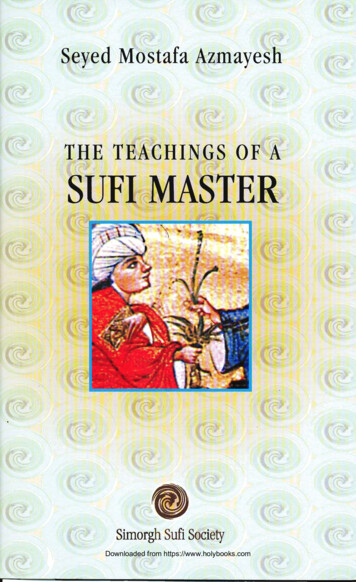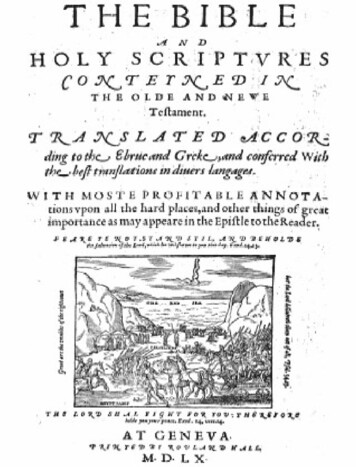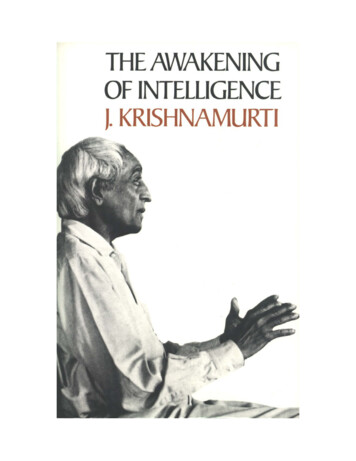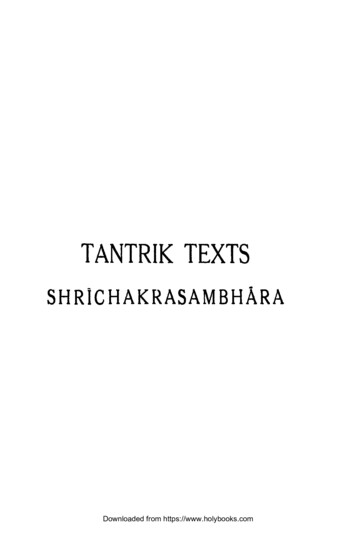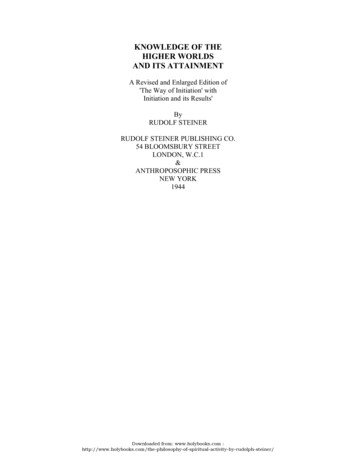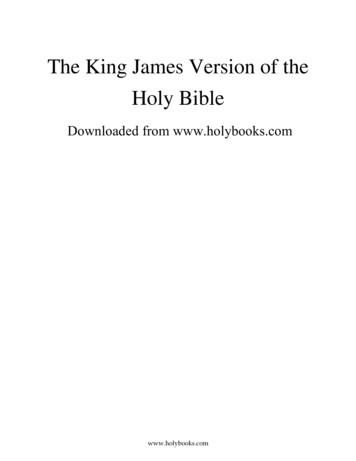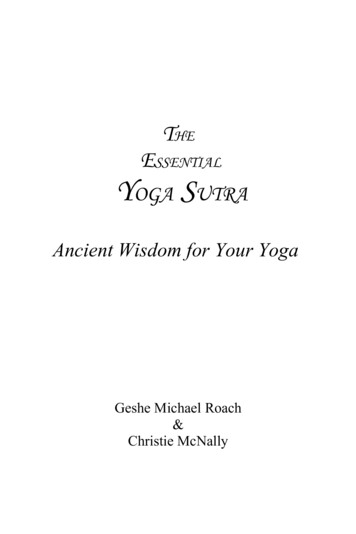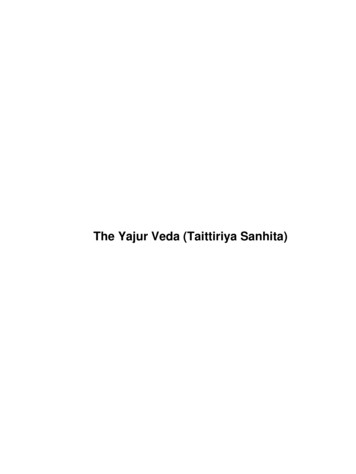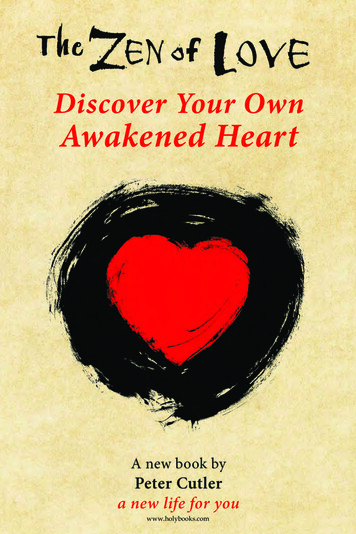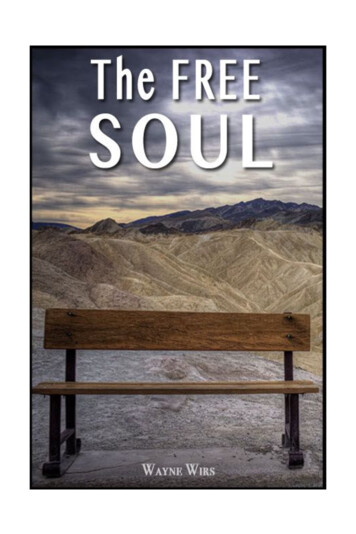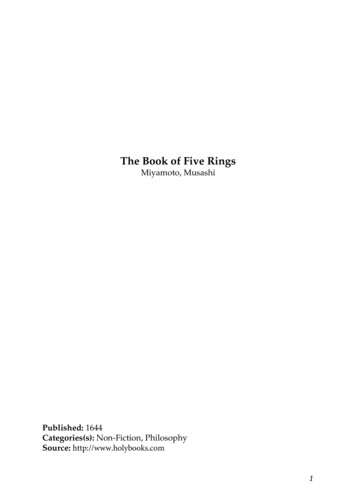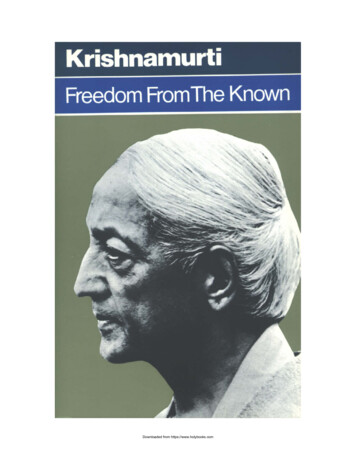
Transcription
Downloaded from https://www.holybooks.com
Table of ContentChapter 1 .3Chapter 2 .13Chapter 3 .20Chapter 4 .25Chapter 5 .29Chapter 6 .38Chapter 7 .46Chapter 8 .54Chapter 9 .58Chapter 10 .64Chapter 11 .72Chapter 12 .79Chapter 13 .83Chapter 14 .88Chapter 15 .93Chapter 16 .99Downloaded from https://www.holybooks.com
Chapter 1Man has throughout the ages been seeking something beyond himself,beyond material welfare - something we call truth or God or reality, a timelessstate - something that cannot be disturbed by circumstances, by thought or byhuman corruption.Man has always asked the question: what is it all about? Has life any meaningat all? He sees the enormous confusion of life, the brutalities, the revolt, the wars,the endless divisions of religion, ideology and nationality, and with a sense ofdeep abiding frustration he asks, what is one to do, what is this thing we callliving, is there anything beyond it?And not finding this nameless thing of a thousand names which he has alwayssought, he has cultivated faith - faith in a saviour or an ideal - and faith invariablybreeds violence.In this constant battle which we call living, we try to set a code of conductaccording to the society in which we are brought up, whether it be a Communistsociety or a so-called free society; we accept a standard of behaviour as part ofour tradition as Hindus or Muslims or Christians or whatever we happen to be.We look to someone to tell us what is right or wrong behaviour, what is right orwrong thought, and in following this pattern our conduct and our thinking becomemechanical, our responses automatic. We can observe this very easily inourselves.For centuries we have been spoon-fed by our teachers, by our authorities, byour books, our saints. We say, 'Tell me all about it - what lies beyond the hills andthe mountains and the earth?' and we are satisfied with their descriptions, whichmeans that we live on words and our life is shallow and empty. We aresecondhand people. We have lived on what we have been told, either guided byour inclinations, our tendencies, or compelled to accept by circumstances andDownloaded from https://www.holybooks.com
environment. We are the result of all kinds of influences and there is nothing newin us, nothing that we have discovered for ourselves; nothing original, pristine,clear.Throughout theological history we have been assured by religious leaders thatif we perform certain rituals, repeat certain prayers or mantras, conform to certainpatterns, suppress our desires, control our thoughts, sublimate our passions, limitour appetites and refrain from sexual indulgence, we shall, after sufficient tortureof the mind and body, find something beyond this little life. And that is whatmillions of so-called religious people have done through the ages, either inisolation, going off into the desert or into the mountains or a cave or wanderingfrom village to village with a begging bowl, or, in a group, joining a monastery,forcing their minds to conform to an established pattern. But a tortured mind, abroken mind, a mind which wants to escape from all turmoil, which has deniedthe outer world and been made dull through dis- cipline and conformity - such amind, however long it seeks, will find only according to its own distortion.So to discover whether there actually is or is not something beyond thisanxious, guilty, fearful, competitive existence, it seems to me that one must havea completely different approach altogether. The traditional approach is from theperiphery inwards, and through time, practice and renunciation, gradually to comeupon that inner flower, that inner beauty and love - in fact to do everything tomake oneself narrow, petty and shoddy; peel off little by little; take time; tomorrowwill do, next life will do - and when at last one comes to the centre one finds thereis nothing there, because one's mind has been made incapable, dull andinsensitive.Having observed this process, one asks oneself, is there not a differentapproach altogether - that is, is it not possible to explode from the centre?The world accepts and follows the traditional approach. The primary cause ofdisorder in ourselves is the seeking of reality promised by another; weDownloaded from https://www.holybooks.com
mechanically follow somebody who will assure us a comfortable spiritual life. It isa most extraordinary thing that although most of us are opposed to politicaltyranny and dictatorship, we inwardly accept the authority, the tyranny, of anotherto twist our minds and our way of life. So fl we completely reject, not intellectuallybut actually, all so-called spiritual authority, all ceremonies, rituals and dogmas, itmeans that we stand alone and are already in conflict with society; we cease tobe respectable human beings. A respectable human being cannot possibly comenear to that infinite, immeasurable, reality.You have now started by denying something absolutely false - the traditionalapproach - but if you deny it as a reaction you will have created another pattern inwhich you will be trapped; if you tell yourself intellectually that this denial is a verygood idea but do nothing about it, you cannot go any further. If you deny ithowever, because you understand the stupidity and immaturity of it, if you reject itwith tremendous intelligence, because you are free and not frightened, you willcreate a great disturbance in yourself and around you but you will step out of thetrap of respectability. Then you will find that you are no longer seeking. That isthe first thing to learn - not to seek. When you seek you are really only windowshopping.The question of whether or not there is a God or truth or reality, or whateveryou like to call it, can never be answered by books, by priests, philosophers orsaviours. Nobody and nothing can answer the question but you yourself and thatis why you must know yourself. Immaturity lies only in total ignorance of self. Tounderstand yourself is the beginning of wisdom.And what is yourself, the individual you? I think there is a difference betweenthe human being and the individual. The individual is a local entity, living in aparticular country, belonging to a particular culture, particular society, particularreligion. The human being is not a local entity. He is everywhere. If the individualmerely acts in a particular corner of the vast field of life, then his action is totallyDownloaded from https://www.holybooks.com
unrelated to the whole. So one has to bear in mind that we are talking of thewhole not the part, because in the greater the lesser is, but in the lesser thegreater is not. The individual is the little conditioned, miserable, frustrated entity,satisfied with his little gods and his little traditions, whereas a human being isconcerned with the total welfare, the total misery and total confusion of the world.We human beings are what we have been for millions of years - -colossallygreedy, envious, aggressive, jealous, anxious and despairing, with occasionalflashes of joy and affection. We are a strange mixture of hate, fear andgentleness; we are both violence and peace. There has been outward progressfrom the bullock cart to the jet plane but psychologically the individual has notchanged at all, and the structure of society throughout the world has beencreated by individuals. The outward social structure is the result of the inwardpsychological structure of our human relationships, for the individual is the resultof the total experience, knowledge and conduct of man. Each one of us is thestorehouse of all the past. The individual is the human who is all mankind. Thewhole history of man is written in ourselves.Do observe what is actually taking place within yourself and outside yourself inthe competitive culture in which you live with its desire for power, position,prestige, name, success and all the rest of it - observe the achievements of whichyou are so proud, this whole field you call living in which there is conflict in everyform of relationship, breeding hatred, antagonism, brutality and endless wars.This field, this life, is all we know, and being unable to understand the enormousbattle of existence we are naturally afraid of it and find escape from it in all sortsof subtle ways. And we are frightened also of the unknown - frightened of death,frightened of what lies beyond tomorrow. So we are afraid of the known andafraid of the unknown. That is our daily life and in that there is no hope, andtherefore every form of philosophy, every form of theo- logical concept, is merelyan escape from the actual reality of what is.Downloaded from https://www.holybooks.com
All outward forms of change brought about by wars, revolutions, reformations,laws and ideologies have failed completely to change the basic nature of manand therefore of society. As human beings living in this monstrously ugly world,let us ask ourselves, can this society, based on competition, brutality and fear,come to an end? Not as an intellectual conception, not as a hope, but as anactual fact, so that the mind is made fresh, new and innocent and can bring abouta different world altogether? It can only happen, I think, if each one of usrecognises the central fact that we, as individuals, as human beings, in whateverpart of the world we happen to live or whatever culture we happen to belong to,are totally responsible for the whole state of the world.We are each one of us responsible for every war because of theaggressiveness of our own lives, because of our nationalism, our selfishness, ourgods, our prejudices, our ideals, all of which divide us. And only when we realize,not intellectually but actually, as actually as we would recognise that we arehungry or in pain, that you and I are responsible for all this existing chaos, for allthe misery throughout the entire world because we have contributed to it in ourdaily lives and are part of this monstrous society with its wars, divisions, itsugliness, brutality and greed - only then will we act.But what can a human being do - what can you and I do - to create acompletely different society? We are asking ourselves a very serious question. Isthere anything to be done at all? What can we do? Will somebody tell us? Peoplehave told us. The so-called spiritual leaders, who are supposed to understandthese things better than we do, have told us by trying to twist and mould us into anew pattern, and that hasn't led us very far; sophisticated and learned men havetold us and that has led us no further. We have been told that all paths lead totruth - you have your path as a Hindu and someone else has his path as aChristian and another as a Muslim, and they all meet at the same door - which is,when you look at it, so obviously absurd. Truth has no path, and that is thebeauty of truth, it is living. A dead thing has a path to it because it is static, butDownloaded from https://www.holybooks.com
when you see that truth is something living, moving, which has no resting place,which is in no temple, mosque or church, which no religion, no teacher, nophilosopher, nobody can lead you to - then you will also see that this living thingis what you actually are - your anger, your brutality, your violence, your despair,the agony and sorrow you live in. In the understanding of all this is the truth, andyou can understand it only if you know how to look at those things in your life.And you cannot look through an ideology, through a screen of words, throughhopes and fears.So you see that you cannot depend upon anybody. There is no guide, noteacher, no authority. There is only you - your relationship with others and withthe world - there is nothing else. When you realize this, it either brings greatdespair, from which comes cynicism and bitterness, or, in facing the fact that youand nobody else is responsible for the world and for yourself, for what you think,what you feel, how you act, all self-pity goes. Normally we thrive on blamingothers, which is a form of self-pity.Can you and I, then, bring about in ourselves without any outside influence,without any persuasion, without any fear of punishment - can we bring about inthe very essence of our being a total revolution, a psychological mutation, so thatwe are no longer brutal, violent, competitive, anxious, fearful, greedy, enviousand all the rest of the manifestations of our nature which have built up the rottensociety in which we live our daily lives?It is important to understand from the very beginning that I am not formulatingany philosophy or any theological structure of ideas or theological concepts. Itseems to me that all ideologies are utterly idiotic. What is important is not aphilosophy of life but to observe what is actually taking place in our daily life,inwardly and outwardly. If you observe very closely what is taking place andexamine it, you will see that it is based on an intellectual conception, and theintellect is not the whole field of existence; it is a fragment, and a fragment,Downloaded from https://www.holybooks.com
however cleverly put together, however ancient and traditional, is still a small partof existence whereas we have to deal with the totality of life. And when we look atwhat is taking place in the world we begin to understand that there is no outerand inner process; there is only one unitary process, it is a whole, totalmovement, the inner movement expressing itself as the outer and the outerreacting again on the inner. To be able to look at this seems to me all that isneeded, because if we know how to look, then the whole thing becomes veryclear, and to look needs no philosophy, no teacher. Nobody need tell you how tolook. You just look.Can you then, seeing this whole picture, seeing it not verbally but actually, canyou easily, spontaneously, transform yourself? That is the real issue. Is it possibleto bring about a complete revolution in the psyche?I wonder what your reaction is to such a question? You may say, 'I don't wantto change', and most people don't, especially those who are fairly secure sociallyand economically or who hold dogmatic beliefs and are content to acceptthemselves and things as they are or in a slightly modified form. With thosepeople we are not concerned. Or you may say more subtly, 'Well, it's too difficult,it's not for me', in which case you will have already blocked yourself, you will haveceased to enquire and it will be no use going any further. Or else you may say, 'Isee the necessity for a fundamental inward change in myself but how am I tobring it about? Please show me the way, help me towards it.' If you say that, thenwhat you are concerned with is not change itself; you are not really interested in afundamental revolution: you are merely searching for a method, a system, tobring about change.If I were foolish enough to give you a system and if you were foolish enough tofollow it, you would merely be copying, imitating, conforming, accepting, andwhen you do that you have set up in yourself the authority of another and hencethere is conflict between you and that authority. You feel you must do such andDownloaded from https://www.holybooks.com
such a thing because you have been told to do it and yet you are incapable ofdoing it. You have your own particular inclinations, tendencies and pressureswhich conflict with the system you think you ought to follow and therefore there isa contradiction. So you will lead a double life between the ideology of the systemand the actuality of your daily existence. In trying to conform to the ideology, yousuppress yourself - whereas what is actually true is not the ideology but what youare. If you try to study yourself according to another you will always remain asecondhand human being.A man who says, 'I want to change, tell me how to', seems very earnest, veryserious, but he is not. He wants an authority whom he hopes will bring aboutorder in himself. But can authority ever bring about inward order? Order imposedfrom without must always breed disorder. You may see the truth of thisintellectually but can you actually apply it so that your mind no longer projects anyauthority, the authority of a book, a teacher, a wife or husband, a parent, a friendor of society? Because we have always functioned within the pattern of a formula,the formula becomes the ideology and the authority; but the moment you reallysee that the question, 'How can I change?' sets up a new authority, you havefinished with authority for ever.Let us state it again clearly: I see that I must change completely from the rootsof my being; I can no longer depend on any tradition because tradition hasbrought about this colossal laziness, acceptance and obedience; I cannotpossibly look to another to help me to change, not to any teacher, any God, anybelief, any system, any outside pressure or influence. What then takes place?First of all, can you reject all authority? If you can it means that you are nolonger afraid. Then what happens? When you reject something false which youhave been carrying about with you for generations, when you throw off a burdenof any kind, what takes place? You have more energy, haven't you? You havemore capacity, more drive, greater intensity and vitality. If you do not feel this,Downloaded from https://www.holybooks.com
then you have not thrown off the burden, you have not discarded the dead weightof authority.But when you have thrown it off and have this energy in which there is no fearat all - no fear of making a mistake, no fear of doing right or wrong - then is notthat energy itself the mutation? We need a tremendous amount of energy and wedissipate it through fear but when there is this energy which comes from throwingoff every form of fear, that energy itself produces the radical inward revolution.You do not have to do a thing about it.So you are left with yourself, and that is the actual state for a man to be who isvery serious about all this; and as you are no longer looking to anybody oranything for help, you are already free to discover. And when there is freedom,there is energy; and when there is freedom it can never do anything wrong.Freedom is entirely different from revolt. There is no such thing as doing right orwrong when there is freedom. You are free and from that centre you act. Andhence there is no fear, and a mind that has no fear is capable of great love. Andwhen there is love it can do what it will.What we are now going to do, therefore, is to learn about ourselves, notaccording to me or to some analyst or philosopher - because if we learn aboutourselves according to someone else, we learn about them, not ourselves - weare going to learn what we actually are.Having realized that we can depend on no outside authority in bringing abouta total revolution within the structure of our own psyche, there is the immenselygreater difficulty of rejecting our own inward authority, the authority of our ownparticular little experiences and accumulated opinions, knowledge, ideas andideals. You had an experience yesterday which taught you something and what ittaught you becomes a new authority - and that authority of yesterday is asdestructive as the authority of a thousand years. To understand ourselves needsno authority either of yesterday or of a thousand years because we are livingDownloaded from https://www.holybooks.com
things, always moving, flowing, never resting. When we look at ourselves with thedead authority of yesterday, we will fail to understand the living movement andthe beauty and quality of that movement.To be free of all authority, of your own and that of another, is to die toeverything of yesterday, so that your mind is always fresh, always young,innocent, full of vigour and passion. It is only in that state that one learns andobserves. And for this a great deal of awareness is required, actual awareness ofwhat is going on inside yourself, without correcting it or telling it what it should orshould not be, because the moment you correct it you have established anotherauthority, a censor.So now we are going to investigate ourselves together - not one personexplaining while you read, agreeing or disagreeing with him as you follow thewords on the page, but taking a journey together, a journey of discovery into themost secret corners of our minds. And to take such a journey we must travel light;we cannot be burdened with opinions, prejudices and conclusions - all that oldfurniture we have collected for the last two thousand years and more. Forget allyou know about yourself; forget all you have ever thought about yourself; we aregoing to start as if we knew nothing.It rained last night heavily, and now the skies are beginning to clear; it is a newfresh day. Let us meet that fresh day as if it were the only day. Let us start on ourjourney together with all the remembrance of yesterday left behind - and begin tounderstand ourselves for the first time.Downloaded from https://www.holybooks.com
Chapter 2If you think it is important to know about yourself only because I or someoneelse has told you it is important, then I am afraid all communication between uscomes to an end. But if we agree that it is vital that we understand ourselvescompletely, then you and I have quite a different relationship, then we canexplore together with a happy, careful and intelligent enquiry.I do not demand your faith; I am not setting myself up as an authority. I havenothing to teach you - no new philosophy, no new system, no new path to reality;there is no path to reality any more than to truth. All authority of any kind,especially in the field of thought and understanding, is the most destructive, evilthing. Leaders destroy the followers and followers destroy the leaders. You haveto be your own teacher and your own disciple. You have to question everythingthat man has accepted as valuable, as necessary.If you do not follow somebody you feel very lonely. Be lonely then. Why areyou frightened of being alone? Because you are faced with yourself as you areand you find that you are empty, dull, stupid, ugly, guilty and anxious - a petty,shoddy, secondhand entity. Face the fact; look at it, do not run away from it. Themoment you run away fear begins.In enquiring into ourselves we are not isolating ourselves from the rest of theworld. It is not an unhealthy process. Man throughout the world is caught up inthe same daily problems as ourselves, so in enquiring into ourselves we are notbeing in the least neurotic because there is no difference between the individualand the collective. That is an actual fact. I have created the world as I am. Sodon't let us get lost in this battle between the part and the whole.I must become aware of the total field of my own self, which is theconsciousness of the individual and of society. It is only then, when the mindDownloaded from https://www.holybooks.com
goes beyond this individual and social consciousness, that I can become a lightto myself that never goes out.Now where do we begin to understand ourselves? Here am I, and how am I tostudy myself, observe myself, see what is actually taking place inside myself? Ican observe myself only in relationship because all life is relationship. It is no usesitting in a corner meditating about myself. I cannot exist by myself. I exist only inrelationship to people, things and ideas, and in studying my relationship tooutward things and people, as well as to inward things, I begin to understandmyself. Every other form of understanding is merely an abstraction and I cannotstudy myself in abstraction; I am not an abstract entity; therefore I have to studymyself in actuality - as I am, not as I wish to be.Understanding is not an intellectual process. Accumulating knowledge aboutyourself and learning about yourself are two different things, for the knowledgeyou accumulate about yourself is always of the past and a mind that is burdenedwith the past is a sorrowful mind. Learning about yourself is not like learning alanguage or a technology or in the present and knowledge is always in the past,and as most of us live in the past and are satisfied with the past, knowledgebecomes extraordinarily important to us. That is why we worship the erudite, theclever, the cunning. But if you are learning all the time, learning every minute,learning by watching and listening, learning by seeing and doing, then you willfind that learning is a constant movement without the past.If you say you will learn gradually about yourself, adding more and more, littleby little, you are not studying yourself now as you are but through acquiredknowledge. Learning implies a great sensitivity. There is no sensitivity if there isan idea, which is of the past, dominating the present. Then the mind is no longerquick, pliable, alert. Most of us are not sensitive even physically. We overeat, wedo not bother about the right diet, we oversmoke and drink so that our bodiesbecome gross and insensitive; the quality of attention in the organism itself isDownloaded from https://www.holybooks.com
made dull. How can there be a very alert, sensitive, clear mind if the organismitself is dull and heavy? We may be sensitive about certain things that touch uspersonally but to be completely sensitive to all the implications of life demand thatthere be no separation between the organism and the psyche. It is a totalmovement.To understand anything you must live with it, you must observe it, you mustknow all its content, its nature, its structure, its movement. Have you ever triedliving with yourself? If so, you will begin to see that yourself is not a static state, itis a fresh living thing. And to live with a living thing your mind must also be alive.And it cannot be alive if it is caught in opinions, judgements and values.In order to observe the movement of your own mind and heart, of your wholebeing, you must have a free mind, not a mind that agrees and disagrees, takingsides in an argument, disputing over mere words, but rather following with anintention to understand - a very difficult thing to do because most of us don't knowhow to look at, or listen to, our own being any more than we know how to look atthe beauty of a river or listen to the breeze among the trees.When we condemn or justify we cannot see clearly, nor can we when ourminds are endlessly chattering; then we do not observe what is we look only atthe projections we have made of ourselves. Each of us has an image of what wethink we are or what we should be, and that image, that picture, entirely preventsus from seeing ourselves as we actually are.It is one of the most difficult things in the world to look at anything simply.Because our minds are very complex we have lost the quality of simplicity. I don'tmean simplicity in clothes or food, wearing only a loin cloth or breaking a recordfasting or any of that immature nonsense the saints cultivate, but the simplicitythat can look directly at things without fear - that can look at ourselves as weactually are without any distortion - to say when we lie we lie, not cover it up orrun away from it.Downloaded from https://www.holybooks.com
Also in order to understand ourselves we need a great deal of humility. If youstart by saying, I know myself', you have already stopped learning aboutyourself; or if you say, 'There is nothing much to learn about myself because I amjust a bundle of memories, ideas, experiences and traditions', then you have alsostopped learning about yourself. The moment you have achieved anything youcease to have that quality of innocence and humility; the moment you have aconclusion or start examining from knowledge, you are finished, for then you aretranslating every living thing in terms of the old. Whereas if you have no foothold,if there is no certainty, no achievement, there is freedom to look, to achieve. Andwhen you look with freedom it is always new. A confident man is a dead humanbeing.But how can we be free to look and learn when our minds from the momentwe are born to the moment we die are shaped by a particular culture in thenarrow pattern of the me'? For centuries we have been conditioned bynationality, caste, class, tradition, religion, language, education, literat
And not finding this nameless thing of a thousand names which he has always sought, he has cultivated faith - faith in a saviour or an ideal - and faith invariably . We have lived on what we have been told, either guided by our inclinations, our tendencies, or compelled to accept by circumstances and . W
